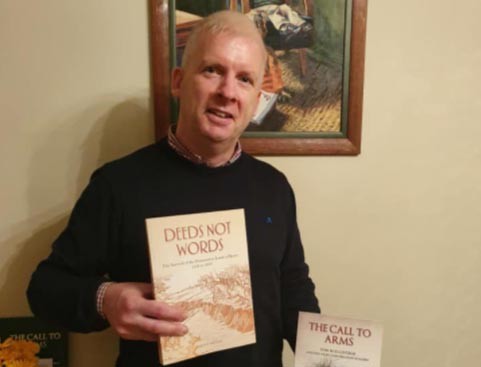Deeds Not Words: The Survival of the Fitzmaurices Lords of Kerry 1550 to 1603
by Martin Moore
(Gabha Beag publications,€20.00)
This splendid study examines the political and military roles of the Fitzmaurices, Lords of Kerry and Barons of Lixnaw, in the Tudor Years of 1550 to 1603. It shows their involvement in local, national and international events of the sixteenth century, from their links to the Kildare revolt of the 1530s through the Desmond rebellions (1569–1583) and the Nine Years’ War. The work provides detailed accounts of a number of fascinating events during that period. One such was the battle of Lixnaw in July 1568, hitherto for the most part overlooked by historians.
In April 1568, Thomas Fitzmaurice Sixteenth Lord Kerry, and his forces raided the territory of the Earl of Desmond, taking “1,100 kine, besides household stuff and broke two churches”. In the following July, Desmond mustered his forces and allies and devastated the lands of Thomas Fitzmaurice. Those who survived the onslaught took refuge in the fortified castle at Lixnaw. Desmond and his forces laid siege to the castle. However, skillfully making use of his knowledge of the geographical features of the area, Fitzmaurice succeeded in routing the vastly more numerous invading force.
Another such event was the siege and capture of Glin Castle in July 1600. Sir George Carew arranged his canons around the castle. He was holding the knight’s young son as a hostage. In a parley with the knight he threatened to kill his son if he did not order the surrender of the castle. This he refused to do. Eventually, after a courageous and determined defence, the government 80-man garrison were overcome and put to the sword.
The siege and capture of Listowel Castle was equally dramatic. Thomas Fitzmaurice, Eighteenth Lord Kerry, was one of the leaders of the Irish rebels. His castle at Listowel was the last to hold out in Munster against the English. In November, Sir Charles Wilmot and his forces attacked the castle. After a courageous defence lasting three weeks the garrison surrendered when the castle was mined. The 18 men of the ward were hanged and women and children were allowed to depart. In the confusion after the surrender, an old woman smuggled Patrick, the five-year-old son of Thomas, to safety. However, he was located by Wilmot who sent him to London to be raised as a Protestant.
After the capture of Listowel Castle, Fitzmaurice joined Hugh O’Donnell in Ulster and later accompanied him on his way south to Kinsale. On the way some of O’Donnell’s forces made a detour and re-took some of the castles in Fitzmaurice territory from their English garrisons. Fitzmaurice was involved in the Battle of Kinsale. After the catastrophic Irish defeat he retreated to Ulster with O’Donnell. A wanted man, he succeeded in evading capture until the end of the war. Then he petitioned the lord deputy of Ireland for mercy. On the instructions of James I, he was pardoned and restored to his lands on condition that he allowed his son and heir Patrick to be fostered and brought up a Protestant.
Thereafter Fitzmaurice was obedient to the crown, although he was never free from suspicion. He sat in parliament in 1613, where his claim of precedence over Lords Slane and Courcy was decided in his favour.
In 1618, a dispute arose between him and his Protestant son Patrick, for whom he had failed to provide a promised marriage settlement. For this – and later because he was suspected of treason – he spent two periods in prison. He died on June 3, 1630 and was buried at Cashel in the chapel of St Cormac.
Patrick succeeded as Nineteenth Lord Kerry. The Fitzmaurices continued to be one of the most influential families in North Kerry until 1783, when the then Lord Kerry, an absent landlord residing in Paris, sold most of his patrimony to Richard Hare.



